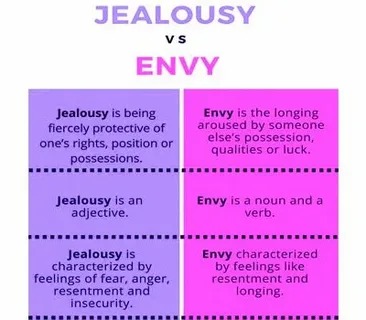In the realm of human emotions, envy and jealousy are often used interchangeably. However, these two complex feelings have subtle distinctions that set them apart. In this article on Arabian Tongue website, we will delve into the Difference Between Jealousy and Envy, exploring their definitions, causes, manifestations, and how they impact our lives.
Difference Between Jealousy and Envy

Envy and jealousy are two completely different terms, each with its causes and motives, and this is what we will explain to you in the following lines:
Envy
Envy can be defined as a feeling of discontent or resentment that arises when one desires something possessed by another person. It is characterized by a longing for something someone else has, whether it’s material possessions, success, talents, or attributes.
Causes of Envy
Envy can stem from various sources, such as:
- Social Comparison: People often feel envious when they compare themselves to others who appear to have more favorable circumstances or qualities.
- Low Self-Esteem: Individuals with low self-esteem are more prone to envy, as they may constantly measure their worth against others.
- Unmet Desires: Unfulfilled aspirations can trigger envy, especially when one believes that others have effortlessly achieved what they desire.
Jealousy
Jealousy, on the other hand, is a complex emotion that arises from the fear of losing something one already possesses, usually in the context of relationships. It often involves the feeling of insecurity and a perceived threat to one’s valued possessions or loved ones.
Causes of Jealousy
Jealousy can be triggered by various factors, including:
- Insecurity: A lack of self-assurance can lead to jealousy, as individuals may doubt their partner’s commitment or loyalty.
- Past Experiences: Previous betrayals or infidelity can make individuals more prone to jealousy in future relationships.
- Communication Issues: Poor communication between partners can breed mistrust and jealousy.
Recommend: what are jinns in quran
Manifestations of Envy and Jealousy
Envy and jealousy have different manifestations and factors, as follows:
Envy
Envy often manifests in the following ways:
- Negative Emotions: Envious individuals may experience anger, frustration, or sadness when comparing themselves to others.
- Covetous Behavior: They may strive to attain what others have, sometimes resorting to unethical means.
- Self-Doubt: Envy can erode self-esteem, leading to a negative self-image.
Jealousy
Jealousy is characterized by:
- Suspicion: Jealous individuals may become overly suspicious of their partner’s actions and intentions.
- Possessiveness: They may exhibit possessive behavior, trying to control their partner’s actions.
- Anxiety: Jealousy often leads to anxiety, as individuals constantly worry about losing what they cherish.
How Envy and Jealousy Impact Our Lives

Both envy and others have a negative impact on people’s lives that is evident in:
Read more: is witchcraft real
Envy
Envy can have both positive and negative effects:
- Motivation: In some cases, envy can drive individuals to work harder and achieve their goals.
- Destruction: Excessive envy can lead to toxic competition, damaged relationships, and unhappiness.
Jealousy
Jealousy’s impact includes:
- Protection: Mild jealousy can help protect relationships by signaling the need for communication and reassurance.
- Destruction: Excessive jealousy can lead to relationship breakdowns, loss of trust, and emotional distress.
Coping with Envy and Jealousy
Humans must understand how to confront and deal with envy and others firmly and methods to protect it, and this we will explain in the following:
Managing Envy
- Self-Awareness: Recognize when envy arises and try to understand its root causes.
- Gratitude: Focus on what you have and practice gratitude to reduce envy.
- Positive Competition: Channel envy into healthy competition that promotes personal growth.
Managing Jealousy
- Open Communication: Discuss feelings of jealousy with your partner honestly and openly.
- Building Trust: Work on building trust in your relationship through transparency and understanding.
- Self-Esteem: Boost your self-esteem to reduce insecurity and jealousy.
Read about: Why Allah tests us
Envy and Jealousy in the Qur’an

In the sacred text of the Qur’an, envy and jealousy are topics of significant importance. These emotions can have a profound impact on individuals and communities, shaping their behavior and attitudes:
The Story of Cain and Abel
One of the most well-known stories in the Qur’an involving envy is that of Cain and Abel (Qabil and Habil). Cain’s envy of his brother Abel’s offering to God led to the first murder in human history. This tragic tale illustrates the devastating consequences of unchecked envy and jealousy.
Prophetic Guidance
The Prophet Muhammad (peace be upon him) provided invaluable guidance on dealing with envy and jealousy. He encouraged believers to seek refuge in Allah from these harmful emotions and advised practicing gratitude for one’s own blessings.
Jealousy And Envy Can Affect Your Health
Jealousy and envy are often used interchangeably, but they have distinct characteristics. Jealousy typically arises from a perceived threat to a valued relationship, while envy stems from a desire for something possessed by someone else. Both emotions can trigger a range of physical and psychological responses.
1. The Physical Toll of Jealousy
Jealousy, when left unchecked, can wreak havoc on your body. Research has shown that chronic jealousy can lead to increased stress levels, elevated blood pressure, and even weaken your immune system. These physical responses can make you more susceptible to illnesses and chronic conditions.
2. The Psychological Burden
Envy, on the other hand, can take a heavy toll on your mental well-being. It often leads to feelings of inadequacy, low self-esteem, and depression. Constantly comparing yourself to others can lead to a negative self-image and erode your self-confidence over time.
3. Jealousy and Relationships
Jealousy can be particularly damaging in romantic relationships. Excessive jealousy can lead to mistrust, insecurity, and conflict. It’s essential to communicate openly with your partner and address any jealousy issues to maintain a healthy relationship.
4. Envy in the Workplace
In the professional sphere, envy can breed a toxic atmosphere. Colleagues who harbor envy may engage in harmful behaviors like undermining each other’s work or spreading rumors. It’s crucial for employers to foster a supportive and inclusive workplace to combat envy.
Jealousy and Envy in the Digital Age
In today’s digital age, where everyone’s achievements and possessions are on display, jealousy and envy have found new avenues to thrive. It’s essential to be aware of these emotions and take proactive steps to address them.
Learn Now: Online Quran Classes
FAQs
Can envy and jealousy coexist?
Yes, it is possible for individuals to experience both envy and jealousy simultaneously, especially in complex situations involving relationships and personal aspirations.
Is envy always a negative emotion?
Envy can have positive aspects, such as motivating individuals to improve themselves. However, excessive envy can be detrimental to one's well-being.
How can I differentiate between envy and jealousy in myself?
Pay attention to the source of your feelings. If you desire something someone else has, it's likely envy. If you fear losing something you already have, it's jealousy.
Can jealousy be a sign of a healthy relationship?
Mild jealousy can signal the need for communication and reassurance in a relationship. However, excessive jealousy is unhealthy and can lead to problems.
Are envy and jealousy purely negative emotions?
While they often come with negative connotations, both envy and jealousy can have positive aspects, such as driving personal growth and protecting valued relationships.
Conclusion
In conclusion, while envy and jealousy are often used interchangeably, they have distinct definitions, causes, manifestations, and consequences. Understanding these differences can help us navigate these complex emotions more effectively, leading to healthier relationships and personal growth.


